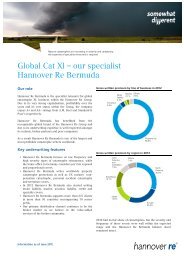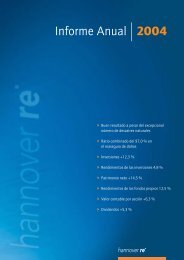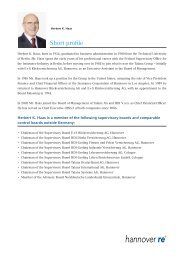Annual Report 2010 - Hannover Re
Annual Report 2010 - Hannover Re
Annual Report 2010 - Hannover Re
You also want an ePaper? Increase the reach of your titles
YUMPU automatically turns print PDFs into web optimized ePapers that Google loves.
motivation, customer satisfaction, business results). The targets<br />
agreed upon with Managing Directors in the treaty and<br />
regional departments are split equally into economic targets<br />
for their department and individual targets. Of the variable<br />
remuneration received by General Managers in the treaty<br />
and regional departments, one quarter is based on the department’s<br />
economic targets and three quarters derive from<br />
individual targets. The economic targets agreed upon for<br />
the departments encompass the combined ratio, contribution<br />
margin (DB) level 5 and IVC in non-life reinsurance and<br />
the premium growth, underwriting result and IVC in life and<br />
health reinsurance.<br />
In the service departments the agreements on targets consisted<br />
entirely of individual targets in the year under review.<br />
This is, however, only intended to be a temporary state of affairs.<br />
It is envisaged that the MbO agreements for managers<br />
in the service departments will in future have a 25% linkage<br />
to corporate objectives and/or department goals.<br />
The Management-by-Objectives process is overseen by Human<br />
<strong>Re</strong>sources Management and Group Controlling Services;<br />
approval of the degree of goal accomplishment is subject to<br />
the approval of the full Executive Board.<br />
For staff on the level of Manager or higher we introduced<br />
a remuneration model linked to the company’s success in<br />
2004, namely the Group Performance Bonus (GPB). This tool<br />
is geared to the minimum return on equity of 750 basis points<br />
above the risk-free interest rate and the return on equity actually<br />
generated. For those participating in the GPB 14.15<br />
monthly salary payments are guaranteed; a maximum of 16.7<br />
salary payments is attainable. Since its launch the maximum<br />
amount of the GPB was paid out in 2006, 2007 and 2009.<br />
Forecast<br />
Economic development<br />
It is to be expected that the recovery in the global economy<br />
will continue in 2011. In this context, the inconsistent picture<br />
across regions – moderate growth in the industrial nations,<br />
vigorous growth in emerging markets – is likely to remain<br />
unchanged. In countries whose economic recovery was not<br />
hampered by structural problems, the crisis-induced slump<br />
has been largely made good. Consequently, economic growth<br />
here is likely to slow somewhat in 2011. In countries experiencing<br />
structural problems, on the other hand, the available<br />
options for delivering economic stimuli are largely exhausted.<br />
Here, the necessary consolidation efforts are expected to<br />
prove a drag on the pace of expansion. All in all, global output<br />
in 2011 is likely to show a low single-digit percentage increase.<br />
Such forecasts are, however, subject to risks: particularly<br />
notable threats to the development of the world economy<br />
could derive from the protracted tension on European government<br />
bonds markets as well as from another sharp correction<br />
in real estate prices in the United States or China.<br />
The economic rally in the United States will be exposed to<br />
considerable risks in the current year owing to ongoing structural<br />
problems. With both earnings and sales prospects under<br />
strain, especially for small and mid-sized enterprises, the<br />
speed with which equipment spending is stepped up could<br />
come under pressure. Given the minimal economic growth<br />
impetus, the prevailing exceptionally high level of unemployment<br />
will probably drop only slightly; the ifo-Institute estimates<br />
the average jobless rate in 2011 at 9.5%. GDP is forecast<br />
to rise by 1.7% in 2011.<br />
Management report<br />
In Germany, on the other hand, the outlook for economic<br />
growth is positive. Favourable earnings prospects, job security<br />
and low interest rates will likely encourage private consumption<br />
and housing investment. Corporate spending should<br />
also increase. Yet the economic momentum in Germany will<br />
probably be considerably less pronounced in 2011 than in<br />
<strong>2010</strong>. Global economic stimuli will be weaker and foreign<br />
trade is expected to make just a modest contribution to the<br />
increase in real gross domestic product. What is more, the<br />
federal government is steering towards a course of consolidation,<br />
which will also have a restraining effect. All in all, real<br />
GDP as calculated by the ifo-Institute is likely to increase by<br />
2.4% in 2011. Manufacturing output in Germany should<br />
therefore again surpass the European average in the coming<br />
year.<br />
<strong>Hannover</strong> <strong>Re</strong> Group annual report <strong>2010</strong><br />
Forecast Management report<br />
93
















